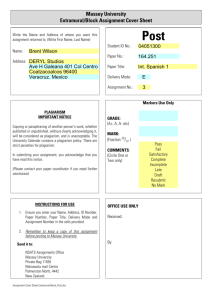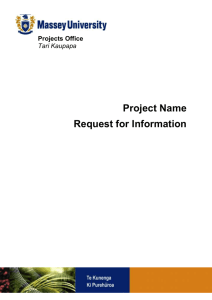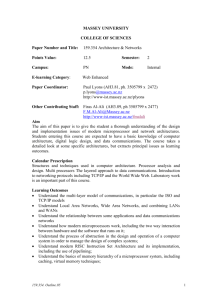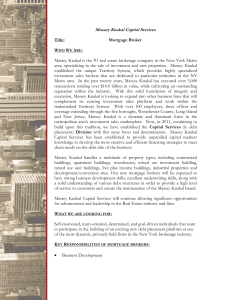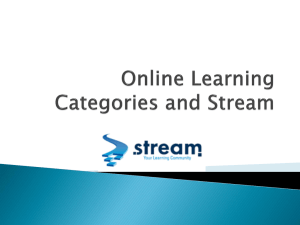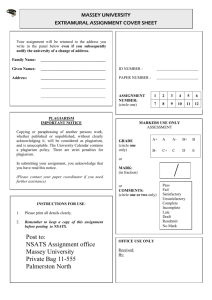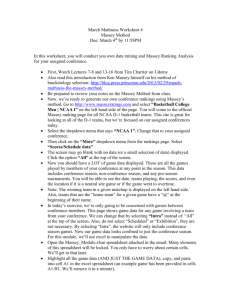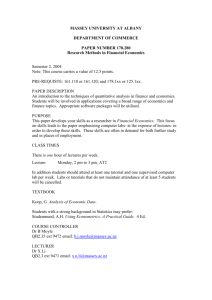Admin Guide - Institute of Information Sciences and Technology
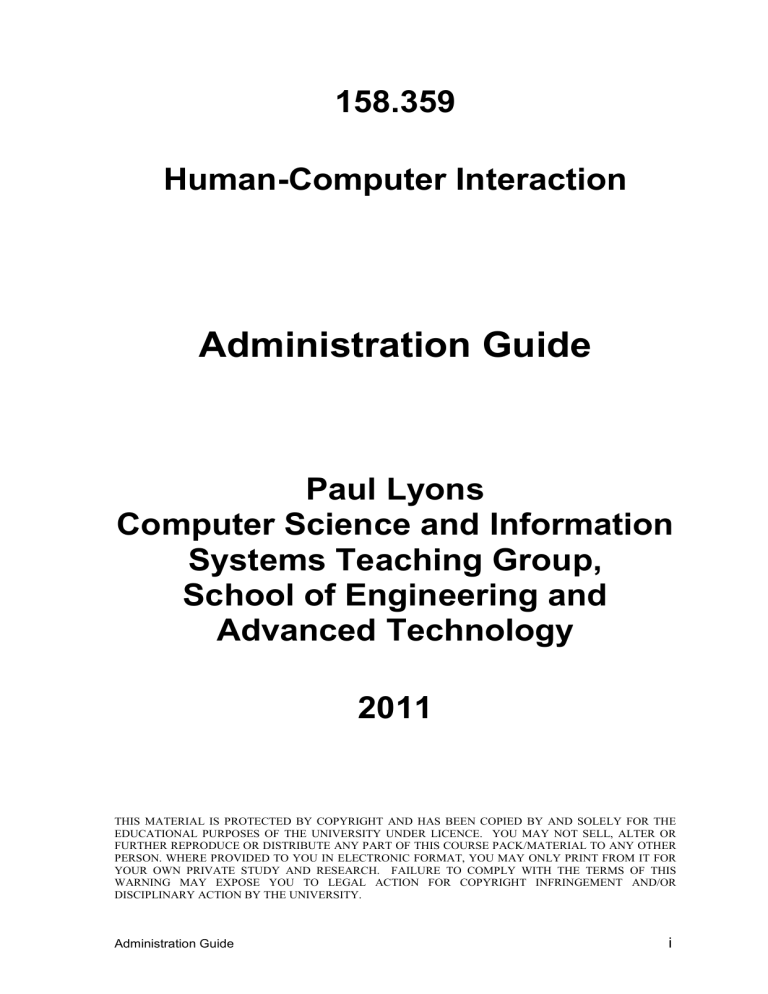
158.359
Human-Computer Interaction
Administration Guide
Paul Lyons
Computer Science and Information
Systems Teaching Group,
School of Engineering and
Advanced Technology
2011
THIS MATERIAL IS PROTECTED BY COPYRIGHT AND HAS BEEN COPIED BY AND SOLELY FOR THE
EDUCATIONAL PURPOSES OF THE UNIVERSITY UNDER LICENCE. YOU MAY NOT SELL, ALTER OR
FURTHER REPRODUCE OR DISTRIBUTE ANY PART OF THIS COURSE PACK/MATERIAL TO ANY OTHER
PERSON. WHERE PROVIDED TO YOU IN ELECTRONIC FORMAT, YOU MAY ONLY PRINT FROM IT FOR
YOUR OWN PRIVATE STUDY AND RESEARCH. FAILURE TO COMPLY WITH THE TERMS OF THIS
WARNING MAY EXPOSE YOU TO LEGAL ACTION FOR COPYRIGHT INFRINGEMENT AND/OR
DISCIPLINARY ACTION BY THE UNIVERSITY. i Administration Guide
ii
Contents
Page
Assignment one: (Title) ................................. Ошибка! Закладка не определена.
Assignment two: (Title) ................................. Ошибка! Закладка не определена.
Extensions and late assignments ..................... Ошибка! Закладка не определена.
Assignment marking guide ............................. Ошибка! Закладка не определена.
Student submission of electronic assignments to Turnitin Ошибка! Закладка не определена.
References ....................................................... Ошибка! Закладка не определена.
Presentation of written work ........................... Ошибка! Закладка не определена.
Appendix 1: Student profile .................................... Ошибка! Закладка не определена.
Appendix 4: The writing process ............................ Ошибка! Закладка не определена.
Writing essays ................................................. Ошибка! Закладка не определена.
Administration Guide
Writing reports ................................................
Ошибка! Закладка не определена.
Appendix 7: Self-evaluation on progress ................
Ошибка! Закладка не определена.
Administration Guide iii
Welcome
This administration guide gives an overview of the important information you need to complete this paper. It contains an outline of the content and structure of the paper, how to get access to study material (such as website references), and an outline of the assessment criteria. The paper outline which is released on the website at the beginning of the semester will contain the schedule for assignments and the final exam.
Human-Computer Interaction is a multi-disciplinary subject, drawing on such areas as
Computer Science, Engineering, Psychology, Ergonomics, Sociology and Visual Design.
158.359 is a broad-based paper which focuses on the analysis, design, and evaluation of user interfaces. It provides the necessary grounding for entry to post-graduate papers in
Human-Computer Interaction and User Interface Design. It is also complements papers in
Software Engineering, Programming and System Development.
The user interface is arguably the most important part of any interactive device or application. To the user, the interface IS the system. In addition to being visually attractive, a well designed user interface should make a system easy to learn, efficient and flexible to use, and should provide good support and feedback to the user. The rapid expansion of web-based applications and the increasing appearance of GUIs (graphical user interfaces) in many everyday devices has only made usability more important.
Usability evaluation forms an important aspect of user-centred design, and includes user testing to determine the learnability, flexibility and efficiency of a system. The ultimate objective us to produce useful system which will support users in carrying out their everyday computer-related tasks in a way that they prefer. Failure to address usability issues can result in users being unable to use an application effectively, and lead to high error rates and feelings of frustration. Perhaps the biggest challenge facing system designers in the next 10 years is teaching application designers to put usability before ease of implementation.
Paper coordinator
Paul Lyons
I have been involved with Human Computer Interaction for twenty years, as a researcher and as a teacher. My principle specialisations are
Administration Guide 21
Innovative Interfaces, Visual Languages and tools for the automatic selection of colours for computer interfaces.
I will be teaching the first half of the course, concentrating on conceptual analysis requirements capture, and design. You can contact me during the semester through the
Stream site for the paper (point your browser at stream.massey.ac.nz and select paper
158.359) or by email.
Contact information. email:
Phone:
Messages:
Email:
URL:
Postal address: p.lyons@massey.ac.nz
063 3569099 x 2472
062 3569099 x 2440 p.lyons@massey.ac.nz
Paul Lyons
CSIT
SEAT www-ist.massey.ac.nz/plyons
Massey University 123
Private Bag 11-222
Palmerston North
22 Administration Guide
Other contributing staff
Elizabeth Kemp
Associate Professor Kemp has been involved with teaching and researching Human Computer interaction software engineering for several years. She is particularly interested in software engineering practice in New Zealand – finding out what processes people follow and what notations they use. Building a suitable interface is also important when developing computer systems and she has also taught and carried out research in this area for many years. Liz will be teaching the latter part of the course, concentrating on interface evaluation.
Contact information. email:
Phone: e.kemp@massey.ac.nz
063 3569099 x 2469
Fax:
Messages:
063 350 2259
063 356 9099 x 2440
Postal address: School of Engineering & Advanced Technology
Massey University, Private Bag, 11 222, Palmerston North
Administration Guide 23
The paper
Aim
Analysis, design, prototyping and evaluation of interfaces to allow efficient and effective use of interactive systems, focussing on the user-centred design approach as a key part of the software development lifecycle. Practical examples will be taken from areas such as multimedia, the web and novel interface applications.
Learning outcomes
On successful completion you should be able to:
1. Understand the iterative nature of the user interface development lifecycle (IDLC) and the relationship between HCI and software engineering.
2. Define what is meant by interface usability in the context of the many different kinds of applications, showing familiarity with a range of interaction devices, paradigms, metaphors and styles, including direct manipulation and the Web.
3. Describe the roles of user and task modelling in the design of user interfaces.
4. Use iterative design techniques to construct a user interface prototype, and be familiar with at least one software tool to support prototyping.
5. Carry out an interface evaluation.
6. Work successfully in a group on a project related to interface design or evaluation.
Topics covered
Paul: HCI fundamentals; analysis and conceptual design; implementation
Liz: Interface evalaution
Structure
Paul’s section of the course comprises a series of recorded lectures with PowerPoint slides
(downloadable from the Stream site for the paper), complemented by class discussions of a development project that may vary from year to year. Up till 2010, time constraints meant that the course was theory-heavy and practice-light. In 2009, I recorded my
24 Administration Guide
lectures, and discovered that the delivery time with a carefully drafted script decreased by about two thirds. Consequently, in 2010 – and with the permission of the class - I trialled a new approach; instead of running three hours of lectures a week, I provided the class with the recorded lectures, which they listened to in their own time, taking one third of the allocated lecture time, and we used the other two hours for workshopping a reasonably challenging interface design problem. The workshop material was scheduled to complement the current lecture topic, and the resulting theory/practical combination seems to have kept everyone’s interest rather better than the traditional lectures. In 2010, the paper was only offered internally, but this year I shall be running the same system in
Distance Learning mode. That will require distance learning students to work in groups by email or Skype or via the Stream discussion facilities, and to assemble a short (ten minute)
PowerPoint (or other relevant technology) presentation each week, which I will watch and comment on. On-campus groups (presumably all groups of internal students, but also possibly groups of extramural students, if they happen to live in Palmerston North) may give their presentations in a scheduled lecture slot, and off-campus groups should post the presentations to the Stream site for the paper.
The workshops are compulsory, and together constitute one possible contributor to the marks for Assignment 1. There is also more conventional assignment, and you will receive EITHER the marks for the workshops OR the marks for the conventional assignment, whichever is the greater. The conventional assignment covers similar ground to the workshops, and it is therefore possible to treat the workshops as a “formative assessment” – that is, an exercise in which you can make mistakes and learn from them, without losing marks in the process (because the conventional assignment gives you a second chance).
I will allocate 50% of the marks for the workshop program, and the other members of the class will allocate the other 50%. There’s a rather complicated algorithm for combining these marks fairly and ensuring that everyone participates in the process, which I’ll explain early in the semester.
Liz Kemp takes a slightly more traditional approach; the study material for her section will be posted on Stream, with topics associated with relevant readings from the textbook.
Each chapter in the textbook includes learning objectives as well as review questions and experiential exercises.
Suggested study programme
Administration Guide 25
You should expect to spend an average of 12.5 hours per week on the paper. For Paul’s section of the course, the average breakdown will be something like the following:
Listening/watching recorded lectures: 1.5 hours (people like to replay some bits)
Reading, study, revision: 1 hour
Discussions regarding this week’s workshop topic: 4 hours
Assembling presentation: 2 hours (assembling presentations can be a time-consuming activity, so this should be shared around members of the group from week to week to even out the workload).
Conventional assignment: 4 hours (again, this needs to be averaged out over the semester)
12.5 hours
For Liz’s section, the total time spent per week should be about the same (12.5 hours), made up notionally of 7 hours study time (reading, revision), 1.5 hours of on-line access
(Stream site, email, discussion groups, web links) and 4 hours of assignment work.
Obviously the breakdown will vary from week to week over the duration of the paper, and from person to person. You should aim to keep up with the formal schedule below; the workshop activities follow the lecture topics, so studying the material relevant to each week’s workshop activity (at the START of the week!) should help you manage your time. The table below provides a suggested schedule to help you monitor your progress and meet assignment deadlines. This is only a suggested one. You may prefer to work out your own schedule, one that suits your personal requirements. The main point is to work to some schedule so that you don’t fall behind.
Approximate Lecture Outline and Teaching Schedule
Chapter Topics
(Preece et al.)
1
2, 3, 4
6, 7, 9, 10,
11
Course overview (PL)
What is HCI?
HCI Fundamentals (Intro)
HCI Fundamentals (contd) PL)
Weeks
Week 1
Analysis & Conceptual Design (PL) Weeks 2-4
Physical Design & Implementation (PL) Weeks 5&6
26 Administration Guide
7, 8, 12-15
Readings
Interface Evaluation (EK)
[2-week Easter break after Week 7]
Week 7
Interface Evaluation (EK)
Other Issues (EK)
Weeks 8-10
Weeks 11-12
Posting of materials
We will not be posting any material to you; all the course material will be provided through the Stream website for 158359.
Contact course/Block course
There are no contact courses of block courses for 158359
Your online learning environment
This paper is web-based. You will be expected to make use of the web for downloading material, for discussions and for uploading workshop presentations and assignments
This paper makes use of the internet to help create an “online learning environment”. This will allow you to communicate and collaborate with others taking the paper and with me.
Any feedback you can provide on the value of this service, both during the paper informally as well as in the formal paper evaluations, would be greatly appreciated.
Accessing the online learning environment helps you do well in the paper in three ways:
increased interaction with your peers. Be sure to visit the site and read and respond to the discussions.
regular participation in online discussions helps increase motivation for finishing readings in a timely manner. This is also a good place to ask questions.
increased exposure to the material, which will increase retention. I’ll post important information, and at times additional readings.
In the appendices you will find information on how to access the online learning environment.
Administration Guide 27
Textbooks and recommended reading
Preece, Rogers and Sharp: Interaction Design, 2 nd
Edition
Order your textbook from:
Bennetts Campus Bookshop
Freepost 118333
Massey University
Private Bag 11004
Manawatu Mail Centre
Palmerston North 4442
Telephone: (06) 354 6020
Internet links
Stream.massey.ac.nz
28 Administration Guide
Assessment
Assignment
Prototyping
Note that the workshops contribute 25 marks, and if your mark for the workshop exceeds your mark for the prototyping assignment, the workshop mark will be used instead.
Due Date Penalty for late submission
12/5/2010 1 mark per day late
Weight
25%
Interface Evaluation and Novel Interfaces 3/6/2011 1 mark per day late
15%
Final Examination TBA 60%
Minimum requirement for paper completion. Average mark for the assignments of 20/40
AND Final exam mark of 24/60 AND combined mark of at least 50%
Assignment submission
Assignments should be submitted through Stream, and results will be made available through Stream. Assignments should generally be marked within three weeks of the submission date; though late submissions may take longer.
Submission date for an assignment is the date on which it is assignments are received and date stamped by Massey.
Remember to complete all coversheet details.
Please go to http://www.massey.ac.nz/?ta5c75148n for instructions on how to upload your assignments to the Stream course website.
Administration Guide 29
Plagiarism
Plagiarism is defined by Massey University as:
Presenting as one’s own work the work of another, including copying or paraphrasing of another’s work without acknowledging it as another person’s work through full and accurate referencing. It applies to material presented through written, spoken, electronic, broadcasting, visual, performance or other medium.
Any form of plagiarism is considered to be Academic Misconduct and is viewed seriously by this University.
See the link ‘Plagiarism’ under Referencing at http://owll.massey.ac.nz for how to avoid plagiarism.
Citing References
You may not need to cite references for the assignments in this course. However, if you do, here is some relevant information.
The reference system used should enable you to indicate the source of facts and opinions without interrupting the flow of your argument, and it must enable a reader to check and pursue these citations quickly and economically. These guidelines are based on the APA
(American Psychological Association) referencing system. APA (2001). Publication manual (5th ed.). Washington, DC: American Psychological Association.
When a reference is made in the body of the assignment it is sufficient to mention the name of the author, the year of publication, and the page number, e.g.:
“..it has been urged (Kotler, 1986, p.9) that …”, or
“..it has been urged by Kotler (1986, p.9) that …”
Cite electronic sources as for other texts. Where page numbers are not provided, use the paragraph number, if available, preceded by the paragraph symbol or the abbreviation para. If neither paragraph nor page numbers are visible, cite the heading and the number of the paragraph following it to direct the reader to the location of the material.
30 Administration Guide
“.. Myers (2000, p. 5) believes..,” or
“.. (Beutler, 2000, Conclusion section, para. 1)..”
Reference List
All references cited in the text must be reported in full standard bibliographical form under a heading “References” at the end of the assignment.
The references should be arranged alphabetically by author’s surname.
When listing references, all lines except the first should be indented five spaces (typically one tab stop). Note the use of italics (or underlining), capitalisation, punctuation and order of elements. For a book, italics should be used for the title. For journal articles, the title of the journal, and the volume number, should be italicised . If your word processor or printer cannot do italics, underline these elements.
The preferred format for different types of publications is as follows:
Books
Biggs, J.B., & Tang, C. (2007). Teaching for quality learning at university: What the student does . (3 rd ed.). New York: Open University Press.
Kember, D., & McNaught, C. (2007). Enhancing university teaching: Lessons from research info award-winning teachers.
London, New York: Routledge.
Ramsden, P. (1997). The context of learning in academic departments. In F. Martin, D.
Hounsell, & N. Entwistle (Eds.). The experience of learning (2 nd ed.) (pp. 198-216).
Edinburgh, Great Britain: Scottish Academic Press.
Stephenson, J. (Ed.). (2001). Teaching and learning online: New pedagogies for new technologies. London: Kogan Page.
Periodicals
Administration Guide 31
Stein, S., & Walker, R. (2010). Tertiary teachers learning about teaching: Integrating theoretical and practical knowledge. Practice and Evidence of the Scholarship of
Teaching and Learning in Higher Education, 5 (1), 2-22.
Tait, A.R. (2004). Clinical governance in primary care: A literature review. Journal of
Clinical Nursing , 13 , 723-730.
Battling the stress monster. (1996, June/July). Safeguard, 17-22.
N.B. use this style when no author is identified or use (n.a.) where author’s name would usually be, date then title.
Occasional publications
Bennett, A. (2007). Recognising and providing for Māori values in water allocation .
Unpublished masters thesis. Massey University, Palmerston North, New Zealand.
Irons, B. (1996, April). Quality study guides . Paper presented at the DEANZ
Conference, Queenstown.
Electronic periodicals
Campbell, I. (2003). The obesity epidemic: Can we turn the tide? Heart, 89 (Suppl. 2), ii22-ii24; discussion ii35-ii37. Abstract retrieved May 21, 2003, from MEDLINE database.
Cave, N.J., Bridges, J.P., Cogger, N., & Farman, R.S. (2009). A survey of diseases of working farm dogs in New Zealand. New Zealand Veterinary Journal, 57 (6), 305-
312.
Internet
All references begin with the same information that would be provided for a printed source (or as much of that information as possible). The web information is then placed at the end of the reference. It is important to use “Retrieved from” and the “date” because documents on the web may change in content, move, or be removed from a site altogether.
32 Administration Guide
Zheng, L., & Smaldino, S. (2003). Key instructional design elements for distance education. The Quarterly Review of Distance Education 4 (2), 153-166. Retrieved
15 May 2006, from ERIC database.
Health of older people in New Zealand.
(n.d.). Retrieved May 21, 2003 from http://www.moh.govt.nz/olderpeople
Note: (n.d.) = no date
Begin with the title when no author is identified.
Court Reporter. (2002, November 21). Alcohol-fuelled driving appals judge . Manawatu
Evening Standard. Retrieved May 21, 2003, from http://www.stuff.co.nz/stuff/eveningstandard/0,2106,2489959a6502,00.html
Stephens, D. (2003, April 24). Why do some people have such a need for control? [Msg
430]. Message posted to http://groups.yahoo.com/group/abuse-survivors-withptsd/message/430
Final examination
Electronic copies of previous exam papers are available online through Massey Library http://kea.massey.ac.nz/screens/exams.htm.
APPENDICES
33 Administration Guide
Appendix 2: How to access Stream
You can access Stream via any computer connected to the internet. If you have an internet connection at home or elsewhere, you can access the Stream site for this paper at any time. It is also possible to access the online environment from work (seek permission first if from work as there may be access issues, e.g. firewall protection), friends’ computers, libraries or similar public access points such as internet cafes.
You can access Stream from the Massey homepage (through 1 or 2 shown above) or directly from http://stream.massey.ac.nz. The following instructions outline the process for accessing Stream from the Massey homepage.
1.
Learning – Online learning . Click on the Stream link to take you to the login page for Stream. The login page also contains links to other resources such as FAQs
(Frequently Asked Questions).
2.
MyMassey on the Massey home page. Then click on the Stream (Moodle) tile.
Tip: When you log into Stream, the system will ask your ID and PIN, use your 8 digit
Massey Student ID number and 4 digit PIN.
34 Administration Guide
Stream home page
1
3
2
1.
The name(s) of your course(s) will be listed here – click on the name to enter the course. Every student has a course called “ Student Guide to Stream ”. Please use this course to learn more about Stream.
2.
Institutional information.
3.
Links to tools (calendar etc).
Stream course page
1
2
3
4
1. The navigation bar: This navigation bar shows you where you are now. You can click on the navigation bar to quickly move around the course.
2. The left-hand column: This column has administration type links i.e. to grades and to change aspects of your profile, as well as quick links to forums and activities.
3. The right-hand column: This has links to useful tools and information. This column may include a link to a calendar, or Library resources as possible examples.
4. The centre column: It has the main learning content, and progresses from top to bottom (usually arranged into weeks or different topics).
Administration Guide 35
Appendix 3: Massey University Library
The Library provides resources and help to support your study. Please contact us if you need help finding information or requesting Library material.
Phone: 0800 MASSEY (0800 627 739) ask for the Library
OR call direct +64 6 350 5670 ext. 2880
Email: library@massey.ac.nz
There are three key ways to access Library help and resources while studying at a
Distance:
Distance Library Service – our delivery system especially for you
Library Website – access to our resources and services
Visiting the Library in person – make the most of any visits to campus
Distance library service
The Distance Library Service delivers course-related Library materials to students who are eligible (students studying predominantly distance or block mode courses in a semester). For information about using the Distance Library Service, see the Library
For Extramurals section of our website (http://library.massey.ac.nz) and the printed
Library Services for Extramurals (Distance Learning) brochure. If you are uncertain about your eligibility, and/or you need a copy of the brochure, please contact the
Distance Library Service.
We will:
Send books and journal articles to you (at no charge).
Note: The Library must comply with the Copyright Act which restricts the amount that can be copied (normally one chapter or article, or 10 percent from any one publication).
Help you to find information that you need for your study.
Teach you how to use databases and resources effectively to do your own research. o Undergraduate students get help from professional librarians over the
36 Administration Guide
telephone (use the 0800 number), email or live via the Internet. We will talk you through finding articles, books and other research on your topic. o Postgraduate students book a Research Consultation. This is training with a subject specialist librarian and can be by telephone, email or live via the
Internet.
Details and Contacts are available on the The Library for Extramurals section of the website.
Studying outside New Zealand?
We will supply materials to help you with your studies, but there may be some restrictions. Please contact us for more information.
When you are using the Library from a distance it is especially vital to plan ahead to allow plenty of time just in case the material or assistance you need is not immediately available.
Library website (http://library.massey.ac.nz)
Administration Guide 37
38
You can use the Library website to find resources by:
searching the Classic Library Catalogue (or Encore ) to find and request books, theses, DVDs and other items held at any of the Massey Libraries.
using Subject Guides – a quick way to the key resources in your subject area
searching Article Databases to find journal and newspaper articles on a topic
searching the Classic Library Catalogue using the Journals tab to find known journal articles from reading or reference lists
printing copies of past exam papers – sorry we don’t have the answers!
You can also log in to your MyLibrary record to check your due dates, renew your books, view your reading history and request items from the Catalogue.
There are request forms on the website to request resources and help – look under the
Q uick Links for Forms .
For advice on finding information see the How to Find section. These pages include onscreen demonstrations of key information skills that will help you get started.
As well as the Library for Extramurals page, use the Library for Undergraduates or
Postgraduates (whichever is appropriate), Subject Guides, Article Databases , and check out our blog Library out Loud (LoL) for the latest news from us.
Administration Guide
Using the library in person
You’re welcome at any of the Massey Campus Libraries – at Albany, Manawatu
(Turitea and Hokowhitu) and Wellington. Services available from these libraries include access to computers and photocopiers, wireless network from your laptop (setup is required), Information Desks where you can get help in using Library resources, research consultations for postgraduate students and EndNote support. All Massey libraries provide help and support, but not all resources are held in every Library.
All the details about our libraries, including opening hours, locations and services are available on the Library website, under About Us .
When you are visiting, why not take advantage of our professional help (at the
Information Desks) or if you are a postgraduate, book a Research Consultation with a subject specialist Librarian. Details are on the Library for Postgraduates page.
EndNote
EndNote is specialised software for organising the research and articles you find. It allows you to:
1 Create, store, and manage your references
2 Import and store references from electronic databases
3 Annotate, sort and search your references
4 Create bibliographies instantly in a variety of bibliographic styles
5 Insert citations into your Microsoft Word documents.
See the Library’s
EndNote webpage (under Quick Links on the website) for further information on ordering the software, and our training and help materials.
Administration Guide 39
Appendix 5: Supporting your learning at
Massey University
Whether you are; a distance or internal student, first year or postgraduate, a high achiever or just scraping by, Massey University is committed to helping you reach your full learning potential.
During your studies, you may want to explore effective ways in dealing with the following:
planning essays and reports
assignment structure and format
using and referencing sources
using Stream to its full effect
enhancing study skills
effective time management strategies
reading and note-taking
exam preparation
Support is available in the following programmes to help you to advance and further develop your skills in academic writing.
Internal Individual Appointments
You can make an appointment to discuss either study skills, using Stream effectively or the review of an assignment with a Learning/Writing Consultant or
Advisor. Make sure you book in advance to avoid disappointment.
Internal Workshops
Each campus offers a series of workshops to cater to the wide genre of students ranging from first year students to postgraduates. Students will be able to participate in on presentations that cover strategies for writing assignments to effective time management.
OWLL (Online Writing and Learning Link) Website
The Online Writing and Learning Link is a centralised website for academic writing and study resources. It allows all Massey students to access an extensive range of
40 Administration Guide
resources about study skills, assignment writing, referencing, exam skills, FAQs and basic Word formatting. Go to http://owll.massey.ac.nz for more information.
Writing and Study Skills Handouts
A large collection of handouts on topics ranging from the correct way of referencing to effective exam strategies is available. View these online at http://owll.massey.ac.nz or request a hard copy if you do not have Internet access.
Student Learning Development Services have created an Academic Writing : A
Guide to Tertiary Level Writing booklet which is also downloadable free from the
OWLL website. If you would like a hard copy, you can purchase it for $5.00 from
Student Learning Development Services.
Extramural Regional Seminars
These are offered in many regional centres around New Zealand at the start of
Semester 1 and 2 introducing students to the academic support services available, offering one-to-one appointment slots as well as covering topics such as time management, reading and note-taking, researching and writing assignments and referencing. These seminars are organised by Student Learning
Development Services, Manawatu campus. For further information go to: http://owll.massey.ac.nz/regionalworkshops_ex.html
Extramural On-Campus Days
These are offered in Auckland, Palmerston North, Wellington and Christchurch on the Saturday before semester starts. Students not only have access to all the activity and content offered at the Regional Seminars (describe above), but also have the opportunity to get further information from lecturers from the Colleges and consultants specialising in Stream and post-graduate work. The On Campus days are also organised by Student Learning Development Services, Manawatu campus.
For further information go to: http://owll.massey.ac.nz/regionalworkshops_ex.html
Extramural Online Assignment Pre-reading Service
If your primary mode of study is distance, you are entitled to utilise the online assignment pre-reading service. Distance students can email up to 2 assignments per semester to Writing Consultants for review and advice, before submitting the assignment for marking to your lecturer. The turnaround time is 3 to 5 working days. All pre-readings are handled through the Manawatu Massey campus. To find out more about the service visit: http://owll.massey.ac.nz/pre-reading.html
Administration Guide 41
Fax or Post Service
If any distance student cannot access the online pre-reading service, a draft assignment can be sent by post or fax to the Manawatu campus. Consultants post back faxed and mailed assignments, so please include a postal address. Faxed and mailed assignments are usually return mailed within 5 working days.
Academic Support Request Form
A web-based Academic Support Request form is located within the OWLL website. distance students can submit requests, ranging from help about writing assignments to effective ways of learning in the university setting. It does not give specific content based assistance. Consultants will respond to these requests by the following business day. Go to http://owll.massey.ac.nz/academic_support.html
Staff Supporting your Learning at Massey
Various support staff members are available to provide you with assistance to all of these services whether it be the Pasifika, Postgraduate, Kaiarahi, Learning, or
Writing consultants. To book an appointment to utilise their services, see below.
Manawatu Campus – Student Learning Development Services (distance and
Manawatu internal students)
For any queries regarding any of the services mentioned above, please contact:
Phone:
Email:
+64 6 3502251
SLC-PN@massey.ac.nz
Fax:
Website:
(06) 350 5760 http://owll.massey.ac.nz
Hours: 8.30am – 4.30pm
Location: Manawatu Campus
Address:
Geography Building 1.11 (between Registry and SST buildings)
For pre-reading or any general enquiries
Student Learning Development Services
Massey University
Private Bag 11 222
Manawatu Mail Centre
Palmerston North 4442
42 Administration Guide
Auckland Campus – Student Learning Centre
For all Auckland students who would like to book an appointment to see an advisor, please contact:
Extramural Learning Coordinator
Phone: +64 9 414 0800, Extn 9288
Wellington Campus – Student Learning Centre
For all Wellington students who would like to book an appointment to see an advisor, please contact:
Extramural Learning Support Advisor
Phone: +64 4 801 5799, Extn 6131
Massey University Extramural Students’ Society (EXMSS)
is your student support organisation. EXMSS services include financial assistance in time of hardship, advocacy support, free phoning to lecturers, communication with other students, free shuttles to contact courses and much more. To connect with EXMSS, your student society, go to www.exmss.org.nz.
Disability Services have offices and staff on the Albany, Manawatu (Turitea) and
Wellington Campuses of Massey University. For any enquiries, please contact
0800 Massey (0800 627 739) and ask to be put through to Disability Services or email: disinfo@massey.ac.nz.
Administration Guide 43
Appendix 6: Feeling overwhelmed?
Are you
…
Having doubts, sudden feelings of incompetence?
Having awful realisations of time running out?
In other words, thinking of withdrawing?
Before you do, ask yourself …
Will I regret this later?
Will I feel better after a cup of coffee/the baby has gone to sleep/the weather has improved?
Do I really have to decide now?
Should I write to or phone my paper coordinator?
Tell yourself
…
I’ve got this far, I might as well finish.
I have the right kind of reasons to ask for an extension of time for the assignment.
There are people around who can help if I ask.
Do
…
Talk about it with your paper coordinator. Often students withdraw because, working in isolation, they do not realise that other students are having the same problems and in fact, compared to others, they are doing very well. Make contact and find out how you are going, and what suggestions the paper coordinator can make to help you. Discuss withdrawing with your family, your employer and others important to you.
Get on with what needs to be done now (leave future tasks to the future).
44 Administration Guide
If after all that you find you have no alternative but to withdraw then
…
Check the Distance Handbook . Note what date you need to withdraw before if you don’t wish to have the paper recorded as a failure.
Please contact Massey University at 0800 MASSEY or email contact@massey.ac.nz to withdraw. But contact me too, if you possibly can. I am interested to hear what your problems have been, and whether there is some way I can make it possible for you to take this paper again in a future year.
The only way you can be withdrawn or change your course is to notify the Enrolment
Office. Writing to the paper coordinator or tutor does not effect your withdrawal.
Administration Guide 45
Appendix 8: Paper evaluation
158.359
Human-Computer Interaction
Send this completed evaluation form in at the end of the paper to
Paul Lyons
CSIT SEAT
Ag/Hort Building
Massey University 321
Private Bag
Palmerston North.
It is deliberately open-ended to permit you to make constructive criticisms. It is intended to be anonymous, so please do not include your name.
Many thanks for your cooperation.
1. Learning outcomes
Did you find that the paper met the learning outcomes?
Comment:
.....................................................................................................................................
.....................................................................................................................................
.....................................................................................................................................
.....................................................................................................................................
.....................................................................................................................................
.....................................................................................................................................
46 Administration Guide
2. Material
Please comment on the appropriateness of the following material to the Learning
Outcomes:
(a) Text
.....................................................................................................................................
.....................................................................................................................................
.....................................................................................................................................
.....................................................................................................................................
(b) Study guide
.....................................................................................................................................
.....................................................................................................................................
.....................................................................................................................................
.....................................................................................................................................
(c) Recorded lectures
.....................................................................................................................................
.....................................................................................................................................
.....................................................................................................................................
.....................................................................................................................................
(d) Workshop activities
.....................................................................................................................................
.....................................................................................................................................
.....................................................................................................................................
.....................................................................................................................................
3.
Assistance from staff
Please comment upon the support given by staff.
.....................................................................................................................................
.....................................................................................................................................
.....................................................................................................................................
.....................................................................................................................................
Administration Guide 47
4. Comments or suggestions you would like to make
.....................................................................................................................................
.....................................................................................................................................
.....................................................................................................................................
.....................................................................................................................................
.....................................................................................................................................
.....................................................................................................................................
.....................................................................................................................................
.....................................................................................................................................
Thank you for taking the time to complete this evaluation form.
48 Administration Guide
